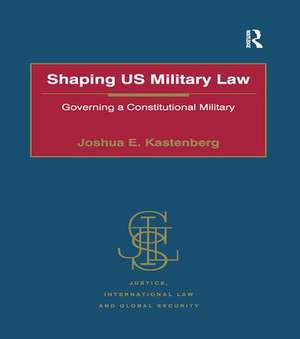Shaping US Military Law: Governing a Constitutional Military
Autor Joshua E. Kastenbergen Limba Engleză Paperback – 26 oct 2016
| Toate formatele și edițiile | Preț | Express |
|---|---|---|
| Paperback (1) | 489.26 lei 6-8 săpt. | |
| Taylor & Francis – 26 oct 2016 | 489.26 lei 6-8 săpt. | |
| Hardback (1) | 1003.75 lei 6-8 săpt. | |
| Taylor & Francis – 28 iun 2014 | 1003.75 lei 6-8 săpt. |
Preț: 489.26 lei
Nou
Puncte Express: 734
Preț estimativ în valută:
93.62€ • 97.56$ • 77.52£
93.62€ • 97.56$ • 77.52£
Carte tipărită la comandă
Livrare economică 03-17 aprilie
Preluare comenzi: 021 569.72.76
Specificații
ISBN-13: 9781138274037
ISBN-10: 1138274038
Pagini: 268
Dimensiuni: 156 x 234 mm
Greutate: 0.45 kg
Ediția:1
Editura: Taylor & Francis
Colecția Routledge
Locul publicării:Oxford, United Kingdom
ISBN-10: 1138274038
Pagini: 268
Dimensiuni: 156 x 234 mm
Greutate: 0.45 kg
Ediția:1
Editura: Taylor & Francis
Colecția Routledge
Locul publicării:Oxford, United Kingdom
Notă biografică
Joshua E. Kastenberg is currently a military judge in the United States Air Force Trial Judiciary. Previously he was Chief of Operations - International Law Doctrine at the Pentagon and chief legal advisor to the commander US Air Forces in Iraq. The views expressed are his own.
Recenzii
’A thorough survey of the Supreme Court’s role in shaping the distinctive military justice system, and the surprising interactions between seemingly extraneous events and the uniformed services, this book will likely end up on the shelf of every military attorney, but should also be part of the education of everyone with an interest in how the United States military governs itself.’ John M. Bickers, Northern Kentucky University, USA ’Josh Kastenberg has produced a fascinating and often provocative study of military law that fills a yawning gap in the existing literature. Because of his exquisite grasp of both law and history he is able to present a fresh perspective on judicial developments in military law that is simply unavailable elsewhere. What is more is that he designed his approach to be accessible not just to legal scholars, but also to students, policymakers, as well as the general public. This is sure to be a must read for anyone interested in understanding how the judiciary shapes the legal architecture of American military governance as the armed forces address the extraordinarily complex challenges of the 21st century.’ Maj. Gen. Charles J. Dunlap, Jr., USAF (Ret.) and Duke University, USA
Cuprins
Preface; Chapter 1 Introduction: A Historic Methodology of Military Law and Governance; Chapter 2; O’Callahan v. Parker; : The Last Year of the Warren Court; Chapter 3 The Burger Court, Military Governance, and the Vietnam Conflict; Chapter 4 Restoring Military Discipline and Maintaining the Military’s Subordination to the Civil Government; Chapter 5 Judicial Supervision of the Military in the Era of Equal Protection; Chapter 6 Rehnquist Court: From; Solorio v. United States; to the War on Terror; Chapter 7 Conclusion;
Descriere
Since the United States’ entry into World War II, the federal judiciary has taken a prominent role in the shaping of the nation’s military laws. Yet, a majority of the academic legal community studying the relationship between the Court and the military establishment argues otherwise providing the basis for a further argument that the legal construct of the military establishment is constitutionally questionable. Centring on the Cold War era from 1968 onward, this book weaves judicial biography and a historic methodology based on primary source materials into its analysis and reviews several military law judicial decisions ignored by other studies.
